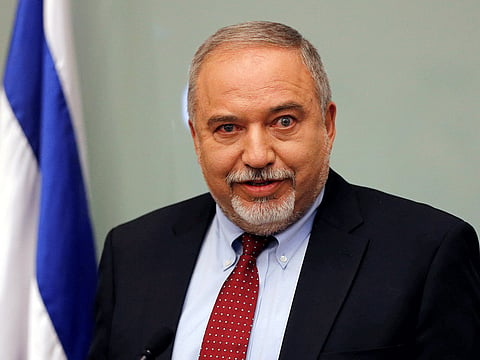Israel defence minister quits after ceasefire, regime in turmoil
Tenuous truce holds in Gaza; Israeli regime in turmoil

Occupied Jerusalem: Israeli regime’s Defence Minister Avigdor Lieberman announced his resignation on Wednesday and called for early elections after a sharp disagreement over a Gaza ceasefire deal, throwing the government into turmoil.
Lieberman also said his party was quitting Prime Minister Benjamin Netanyahu’s coalition, leaving the premier with only a one-seat majority in parliament.
“What happened yesterday — the truce combined with the process with Hamas — is capitulating to terror,” Lieberman told journalists in explaining his reasons for resigning.
“What we’re doing now as a state is buying short-term quiet, with the price being severe long-term damage to national security.”
He added later: “We should agree on a date for elections as early as possible.”
Netanyahu has defended Tuesday’s ceasefire deal that ended the worst escalation between Israel and Palestinian fighters in Gaza since a 2014 war.
An official from Netanyahu’s Likud party hit back at speculation that early elections would be called and said the prime minister would take charge of Lieberman’s portfolio at least temporarily.
“There’s no obligation to go to an election in this time of security sensitivity,” the official said on condition of anonymity.
The ceasefire held on Wednesday, but Netanyahu was seeking to combat criticism of the decision.
Also Read: Israeli aggression in Gaza unwarranted
Beyond Lieberman’s resignation, several hundred Israelis living near the border with Gaza protested on Tuesday night to call for further action against Hamas.
Netanyahu defended his strategy. “In times of emergency, when making decisions crucial to security, the public can’t always be privy to the considerations that must be hidden from the enemy,” he said.
Hamas portrayed the ceasefire as a victory and thousands of residents of the blockaded enclave took to the streets late Tuesday to celebrate.
In a statement on Wednesday, Hamas called Lieberman’s resignation a “victory for Gaza.”
The Egyptian-brokered truce was announced by Gaza fighter groups, including Hamas, on Tuesday.
A diplomatic source familiar with the agreement said it involved returning to arrangements put in place following the 2014 war, but warned: “The situation remains very precarious and can blow up again.
“What we have seen in the past 48 hours was very dangerous and no efforts should be spared to avoid similar flare-ups.”






